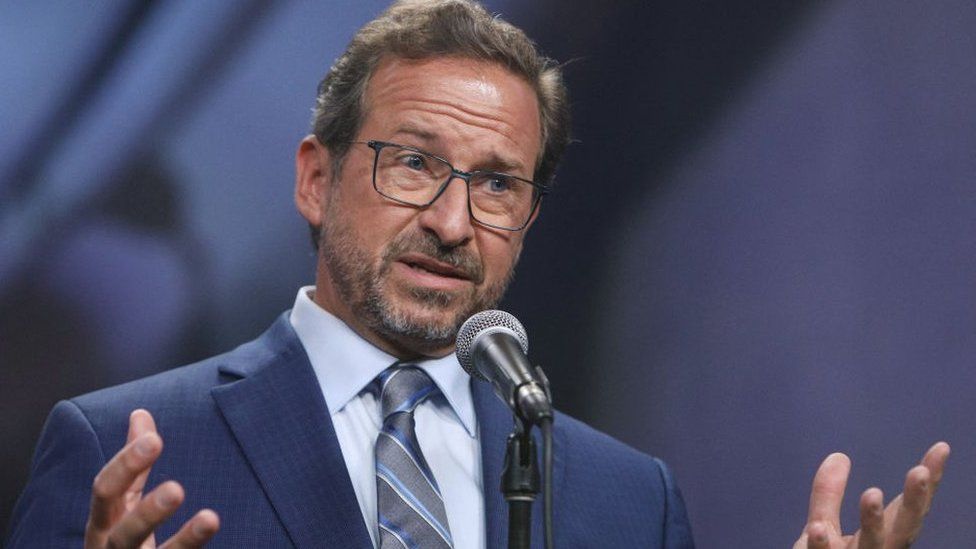ARTICLE AD BOX
 Image source, Getty Images
Image source, Getty Images
Bloc Quebecois leader Yves-Francois Blanchet said he believes the monarchy in Canada is "a thing of the past."
By Nadine Yousif
BBC News, Toronto
With the upcoming coronation of King Charles III, the Canadian province of Quebec is resurfacing a debate on the country's ties to the British monarchy.
On Wednesday, parliamentarians will vote on whether Canada should sever ties with the monarchy, after Bloc Quebecois leader Yves-Francois Blanchet tabled a motion that forced a conversation in House of Commons about the Crown.
His move follows the refusal of 14 recently-elected Quebec politicians to recite an oath of allegiance to the King during their swearing-in to the provincial legislature, as required by Canadian law.
Speaking to reporters, Mr Blanchet admitted that his motion is likely to fail, but he said the failure will show Quebecers that federal politicians "prefer to support the King than the people".
In Canada, the monarch - now King Charles - is the head of state. The monarchy serves a mainly symbolic role, with the power to govern entrusted to the Canadian government.
Changing the current system would need approval from both the House of Commons and the Senate in parliament, as well as the unanimous consent of all 10 provinces
Members of Canada's governing Liberal party have already said they will oppose the motion.
While Mr Blanchet's motion may fail, the future of Quebec politicians who refused to swear the oath to the Crown remains uncertain.
Their refusal could lead to a bill that seeks to redefine the requirement to take the oath of allegiance in the province - if they are able to sit in Quebec's legislature at all - and political watchers say they are eager to see how the dispute unfolds.
Quebecers have long-opposed the Crown
Quebec's relationship with the monarchy is complex.
Many Quebecers are in favour of Canada being a republic rather than a constitutional monarchy - a sentiment that is tied to the province's history of being a French-speaking region that was once under British colonial rule.
The province has twice voted against independence in referendums, and the push for Quebec sovereignty has weakened over the years. But Quebec politicians have continued to put forward policies that seek to define the province as distinct from English Canada.
When tabling his motion on Tuesday, Mr Blanchet said he believes Canada's tie to the British Crown is "archaic."
"It is a thing of the past, it is almost archaeological, it is humiliating," he said.
Frustration with the oath of allegiance to the Crown isn't new. As early as 1970, members of the sovereigntist Parti Quebecois, a separatist provincial political party in Quebec, had openly opposed it.
Their opposition led to the creation of a second, supplementary oath in 1982 that also pledges loyalty to the people of Quebec.
Since then, politicians in that province have had to recite both oaths before taking office. In 2018, some recited the oath to the Crown behind closed doors in protest.
Mr Blanchet, whose party represents Quebec interests in the federal House of Commons, said many recite the oath only because they have to.
"We are a conquered people that still have to swear allegiance to a conquering King," he said.
This sentiment was echoed by the 14 members of Quebec's National Assembly, who have not yet recited the oath ahead of the assembly's commencement in November - an unprecedented number of politicians to do so.
"What's happening now is really dramatic," said Daniel Beland, a political science professor at McGill University in Montreal, who added the politicians may not be able to sit or receive their salary without reciting the oath.
"The Constitution Act of 1867 clearly states that to become a member of a provincial legislature, you need to perform the oath of allegiance," Beland said.
"There is quite a bit of suspense about what will happen."
Ewan Suaves, spokesperson for Quebec Premier Francois Legault, said the law is clear that politicians must recite the oath in order to sit. But added that the premier, too, opposes it.
"We agree that it's time to end the obligation to swear allegiance to King Charles III, but it takes a Bill in order to do so. And to present or pass a Bill, the [members] must sit," Mr Suaves said.
How does the rest of Canada feel about the Crown?
That sentiment is strongest in Quebec, where 79% agreed.
In response to Mr Blanchet's motion asking Canada to sever its ties to the Crown, Mr Trudeau said "there is not one Quebecer who wants the [Canadian] constitution reopened."
Mr Beland said that at a time when Quebec's independence movement has weakened, there has been more emphasis on symbolic assertions of sovereignty - like refusing to take the oath of allegiance.
He added the refusal to take the oath could be a way to seize political momentum by the Parti Quebecois, who lost seats in the recent election.
"This is about broad principles, but this is also a lot about political posturing," Mr Beland said.
Amending the oath requirement is also a complicated task, and there is disagreement among experts on how it can be done.
Some believe a bill passed by the Quebec National Assembly would be enough to replace or amend the oath of allegiance. Others, however, believe any changes to the oath would require an amendment of Canada's constitution.
The latter, "of course, is much more difficult to do," said Mr Beland, as it would require agreement from all of Canada's provinces.

 2 years ago
66
2 years ago
66








 English (US) ·
English (US) ·